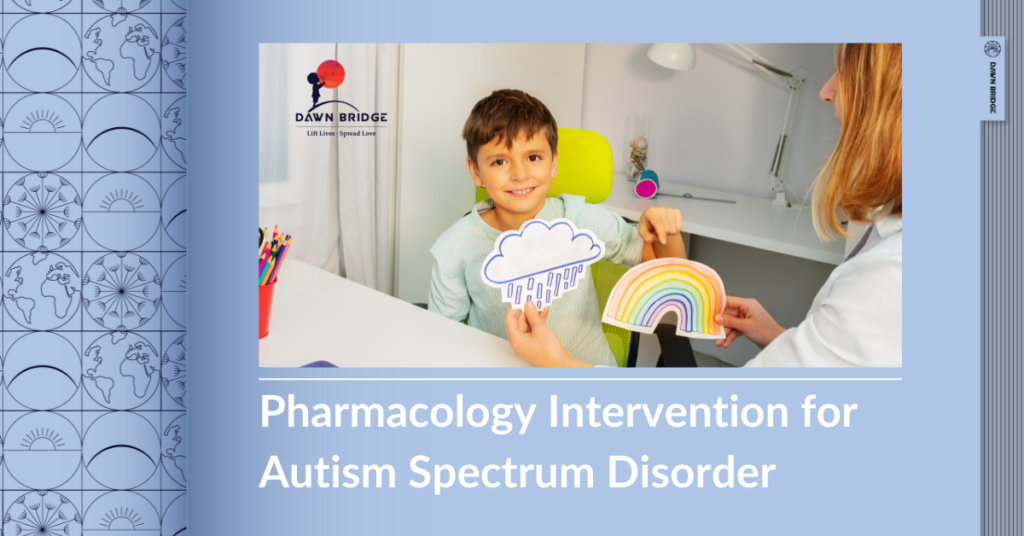Before starting pharmacotherapy in children with an autism spectrum disorder (ASD), there is a lot of consideration. There is a consensus that a comprehensive pretreatment evaluation should be administered. Medication can only be warranted if the child’s behaviour interferes with their ability to access therapy and comorbidities and other external stressors have been encountered. Every child with autism spectrum disorder should be assessed on a case by case basis. Medical practitioners should also collect medical history from various sources, including patients, parents, therapists and special needs educators, to identify the most appropriate target behaviour. Hence, specialists familiar with autism spectrum disorder will prescribe the proper medication for patients after a careful and comprehensive assessment.
When choosing a drug:
- Likelihood of improvement in the target symptom
- Potential side effects
- Available formulations
- Dosing schedule
- Cost
- Requirement for laboratory monitoring
Here is a list of the current medications approved by the FDA for autism spectrum disorders:
| Risperidone | Aripiprazole | |
| Mechanism | Involve a reduction of dopaminergic neurotransmission in the mesolimbic pathway | Partial agonist at the D2 and 5-HT1A receptors and an antagonist at the 5-HT2A receptor, lowering dopaminergic neurotransmission in the mesolimbic path. |
| Indication | Children from 5-18 years old with autism are associated with irritability, including aggression, temper, tantrums, self-injurious behaviour, and quickly changing moods. | 6-17 years old children with associated irritability( including aggression, deliberate self-injurious behaviour, temper tantrums, and quickly changing moods). |
| Possible Side Effects | 1. Activating effects (e.g., akathisia, restlessness) 2. Sedating effects (e.g., sedated state, drowsiness) 3. Angioedema 4. Dyslipidemia 5. Extrapyramidal SymptomsDysphagiaOesophageal dysmotilityAspiration 6. Hematologic abnormalitiesLeukopeniaNeutropenia, ThrombocytopeniaAgranulocytosis 7. Neuroleptic malignant syndrome 8. Orthostatic hypotension 9. Sexual dysfunction 10. Temperature dysregulation 11. Weight gain | 1. Weight gain 2. Akathisia, headache 3. Orthostatic hypotension, tachycardia 4. Hyperglycemia 5. Abdominal distress, constipation 6. Neutropenia 7. Arthralgia 8. Nasal congestion |
Currently, scientists are researching various drugs that can be used to address the symptoms of autism spectrum disorders in the future.
Here is the list of potential drugs and their possible benefits:
- Methylphenidate: To improve symptoms of hyperactivity and inattention in children with ASD.
- Guanfacine, clonidine: To improve inattention, hyperactivity, and impulsivity symptoms in children with ASD.
- Atomoxetine: To improve symptoms of hyperactivity and inattention in children with ASD.
- Olanzapine, clozapine, quetiapine, ziprasidone, haloperidol: To treat irritability and self-injurious and aggressive behaviour in children with ASD.
- Fluoxetine: To treat repetitive behaviour in children with ASD.
- Fluvoxamine: To reduce repetitive behaviours and has better effects in adults with ASD.
- Sertraline: To improve repetitive and disruptive behaviour.
- Paroxetine: To reduce aggression.
- Melatonin: For sleep disturbance.
To sum up
It is essential to know that every child with ASD needs to be carefully assessed. After a comprehensive evaluation conducted by specialists, they will be given the best course of treatment, according to their specific condition and response to different medications. Medical practitioners should continuously monitor and examine their target symptoms to adjust the type and doses of drugs. There is still a rising need to research other drugs to encounter target symptoms such as aggressiveness, restlessness and impulsivity.
References:
- Aman MG, Farmer CA, Hollway J, Arnold LE. Treatment of inattention, overactivity, and impulsiveness in autism spectrum disorders. Child Adolesc Psychiatr Clin N Am 2008; 17:713.
- Aman MG, Novotny S, Samango-Sprouse C, et al. Outcome measures for clinical drug trials in autism. CNS Spectr 2004; 9:36.
- Kaat AJ, Lecavalier L, Aman MG. Validity of the aberrant behavior checklist in children with autism spectrum disorder. J Autism Dev Disord 2014; 44:1103.
- Myers SM. The status of pharmacotherapy for autism spectrum disorders. Expert Opin Pharmacother 2007; 8:1579.
- Scottish Intercollegiate Guidelines Network. Assessment, diagnosis and clinical interventions for children and young people with autism spectrum disorders. A national clinical guideline. Scottish Intercollegiate Guidelines Network, Edinburgh 2007. www.sign.ac.uk/guidelines/fulltext/98/index.html (Accessed on November 10, 2011).
- Hyman SL, Levy SE, Myers SM, COUNCIL ON CHILDREN WITH DISABILITIES, SECTION ON DEVELOPMENTAL AND BEHAVIORAL PEDIATRICS. Identification, Evaluation, and Management of Children With Autism Spectrum Disorder. Pediatrics 2020; 145.
- Volkmar F, Siegel M, Woodbury-Smith M, et al. Practice parameter for the assessment and treatment of children and adolescents with autism spectrum disorder. J Am Acad Child Adolesc Psychiatry 2014; 53:237.
- Abilify (aripiprazole). US Food & Drug Administration (FDA) approved product information. Revised July 2014. US National Library of Medicine. www.dailymed.nlm.nih.gov (Accessed on July 17, 2014).
- Leskovec TJ, Rowles BM, Findling RL. Pharmacological treatment options for autism spectrum disorders in children and adolescents. Harv Rev Psychiatry 2008; 16:97.
- West L, Waldrop J, Brunssen S. Pharmacologic treatment for the core deficits and associated symptoms of autism in children. J Pediatr Health Care 2009; 23:75.
- Parikh MS, Kolevzon A, Hollander E. Psychopharmacology of aggression in children and adolescents with autism: a critical review of efficacy and tolerability. J Child Adolesc Psychopharmacol 2008; 18:157.
- Ching H, Pringsheim T. Aripiprazole for autism spectrum disorders (ASD). Cochrane Database Syst Rev 2012; :CD009043.
- Oswald DP, Sonenklar NA. Medication use among children with autism spectrum disorders. J Child Adolesc Psychopharmacol 2007; 17:348.
- Huffman LC, Sutcliffe TL, Tanner IS, Feldman HM. Management of symptoms in children with autism spectrum disorders: a comprehensive review of pharmacologic and complementary-alternative medicine treatments. J Dev Behav Pediatr 2011; 32:56.

